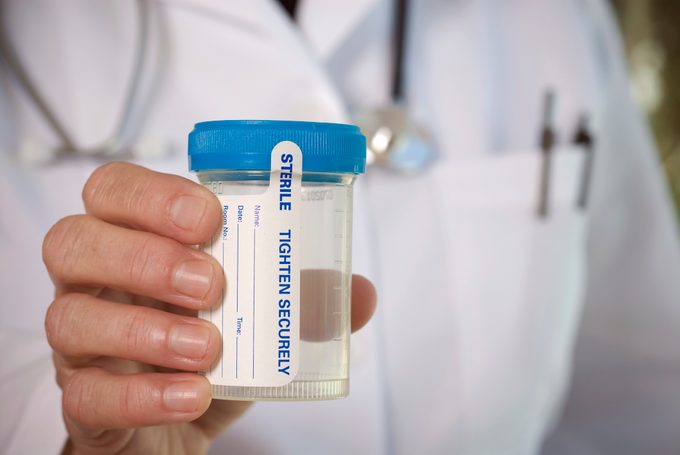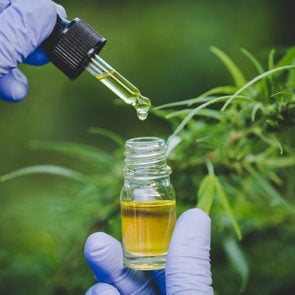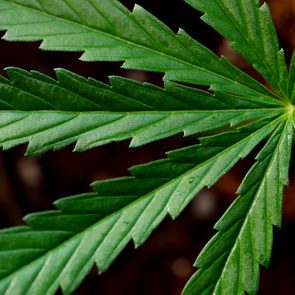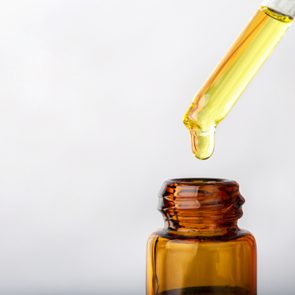Does CBD Show Up on a Drug Test?
Updated: Mar. 02, 2021
Trace amounts of THC may cause you to fail a drug test if you use CBD. Experts explain why and what to look for in a CBD product.
Our editors and experts handpick every product we feature. We may earn a commission from your purchases.
Does CBD show up on a drug test?
Maybe you use CBD for anxiety, headaches, or to treat chronic pain. CBD doesn’t make you high but you might wonder whether using such products will make you fail a drug test.
It’s hard to get a clear answer on whether people who regularly use cannabidiol (CBD) run the risk of a positive drug test for marijuana.
Urine and hair screening tests look for delta-9-tetrahydrocannabinol (THC). THC is the most abundant cannabinoid, which are naturally occurring compounds, found in marijuana plants. THC is the compound that causes a high.
CBD is not on the drug-testing radar. The problem is that CBD products, like CBD oil, may contain trace amounts—or even illegally large amounts—of THC.
CBD can come from hemp or marijuana plants, which are both varieties of the Cannabis sativa plant. Marijuana contains much more THC than hemp so the source of the CBD products can impact the THC content. (Learn more about the differences between CBD vs THC.)
Here’s why that happens, and what you can do to avoid being exposed to THC and testing positive for marijuana as a side effect of using CBD products.
Positive workplace tests for cannabis on the rise
Marijuana is the illicit drug most commonly detected by U.S. workplace testing, according to Quest Diagnostics.
While fewer people are testing positive for opiates or heroin, in its analysis of more than 9 million workplace drug tests from 2019, the lab company reported positive marijuana tests have seen double-digit growth in some parts of the country.
For example, the rate of positive drug tests hit 4.1 percent in the western U.S. As for the U.S. overall, 3.1 percent of drug tests were positive for marijuana in 2019—the most since 2003, when 4.5 percent were positive.
“Marijuana continues to be an enduring presence in the U.S. workforce. Changing attitudes toward its use could pose heightened risks especially in safety-sensitive positions and those states exploring legalization,” says Barry Sample, Quest senior director of science and technology, in a release accompanying the report.
Beware of false positives
There’s already lots of confusion swirling around workplace drug testing for cannabis. Aren’t you safe from controversy if you’re sticking to CBD only? Not exactly.
If you’re one of the millions of Americans who undergo employment-related drug screening, and you use CBD regularly, it’s worth proceeding with caution, because you’re not 100 percent in the clear.
Full-spectrum CBD products
If you’re using a full-spectrum CBD product—meaning it includes other compounds such as cannabinoids, flavonoids, and terpenes found in the plant—there’s a chance it could contain THC. (Terpenes are aromatic compounds found in plants.)
Regular use of a product containing even small amounts of THC could trigger a positive urine, saliva, or hair test for marijuana, says Ryan McLaughlin, an assistant professor of integrative physiology and neuroscience at Washington State University in Pullman.
THC and other cannabinoids may build up in the body, likely in fatty tissue, so regular exposure to even trace amounts could lead to levels high enough to trigger a positive drug test.
Broad-spectrum CBD products
Broad-spectrum products are full-spectrum products with the THC removed, although this requires the use of solvents that may leave a nasty residue in the product, says Greg Gerdeman, PhD, a cannabis neuroscientist and educator.
What’s more, there’s still no guarantee these products are truly THC free, he says.
“It is easy to create a product that is completely made from CBD and has no THC contamination,” Gerdeman says. “Unfortunately, it’s even easier to say it has no THC when it actually does.”

THC amount detected in drug tests
Urine tests are the most common tests used in drug screening. The cutoff for a positive test for urine is 50 nanograms of THC per milliliter. (Note: Urine tests actually look for a metabolite of THC, THC-COOH, which is a compound made by the body after THC is metabolized.)
In 2019, the U.S. Department of Health and Human Services endorsed the use of oral fluid testing (a mouth swab) in federal drug screening programs (before this, only urine tests were allowed). They recommended a screening cutoff of 4 nanograms per milliliter of oral fluid.
Blood tests may be used for roadside driver impairment checks, for example in Colorado and Washington, which put the cutoff for driving while intoxicated at 5 nanograms of THC per milliliter of blood.
Hair tests check for the inactive metabolite of THC, and typically use a cutoff of 1 picogram per milligram for screening.
Meanwhile, since saliva tests are not usually used when it comes to detecting THC, there is no set cutoff. However, per recommendations from a 2017 study in the Journal of Medical Toxicology, a 4 nanograms per milliliter limit has been suggested.
If you want to completely avoid the possibility of failing a drug test while using CBD, opt for CBD isolates that contain CBD isolated from THC and other cannabis components.
Marijuana versus hemp
Another factor to consider is the plant source of your CBD. CBD oil from hemp plants (strains of the Cannabis sativa plant with no more than 0.3 percent THC) is by definition less likely to be contaminated with significant amounts of THC.
The risk is higher with CBD derived from higher-THC plants, for example, those grown in some states where medicinal marijuana is legal.
There’s currently little or no regulation of CBD products at the federal level, although the U.S. Food and Drug Administration has issued warning letters to companies for “marketing CBD products to treat diseases or for other therapeutic uses for humans and/or animals.”
These companies were also warned about marketing CBD as a dietary supplement and adding it to human and animal food.
So far in 2020, the FDA has issued 14 warning letters to companies selling CBD products, including 11 to manufacturers who claimed their CBD products “mitigate, prevent, treat, diagnose, or cure Covid-19.”
Hemp hair oil could cause problems too
Although the hemp plant has much lower levels of THC than marijuana, it still has some.
And even hemp products that aren’t ingested could lead to a positive drug test, recent research suggests.
A 2019 study published in Scientific Reports found that nearly 90 percent of volunteers who applied hemp oil to their hair every day for six weeks wound up with hair tests positive for THC, CBD, or cannabinol, and one-third tested positive for all three compounds.
The researchers call for recording cosmetic hemp oil use when a person undergoes a hair test for drug screening.
They also urge that “the interpretive value of cannabinoid hair measurements from people reporting application of hemp oil is treated with caution in both criminology and public health.”
Third-party testing of CBD products
States with medical and recreational marijuana programs test the purity and potency of products for sale, and many dispensaries offer CBD-based products.
“If you have the option to be part of a medical cannabis program, get your CBD through that program, because it’s more likely to be certified as clean and safe,” says Martin A. Lee, the co-founder and director of Project CBD, a California-based non-profit, and author of Smoke Signals: A Social History of Marijuana–Medical, Recreational and Scientific.
If this isn’t an option, Lee and other experts say your best bet on the open marketplace is to find products that have been tested by a third party and can document this with a Certificate of Analysis, or COA.
Third-party testing should be done by labs with no financial relationship to the CBD maker. Testing involves analyzing a product’s cannabinoid and terpene content, potency and purity, and checking for pesticides, microbial contamination (like mold), and heavy metals.
Lee also advises consumers to read labels carefully. “There shouldn’t be additives, even if some of these additives are legal, you shouldn’t buy products with food dyes,” he says. “If you see things that you wouldn’t ordinarily want to see on something in the supplement aisle, then don’t get that product.”
Consumers should also look for products that are certified organic, produced by carbon dioxide extraction, and free of solvents, pesticides, and herbicides, Lee adds.
Nevertheless, he warns, “What’s said about a product and what’s actually true about the product may not always match.”
Next, read what doctors wish you knew about CBD for dental pain and anxiety.




















